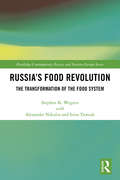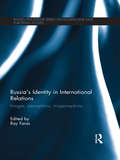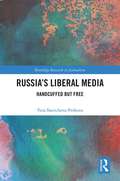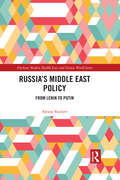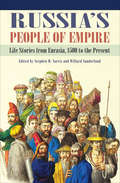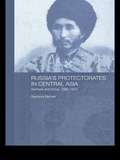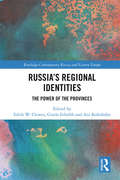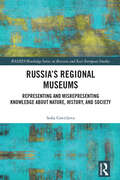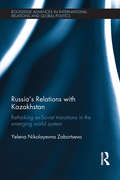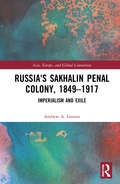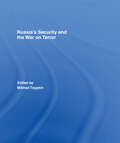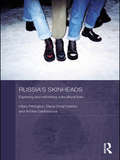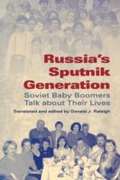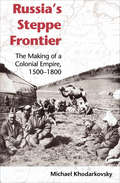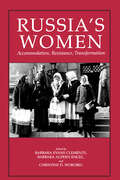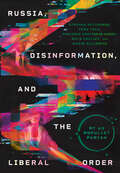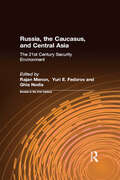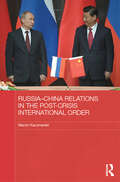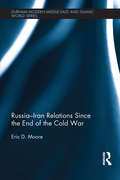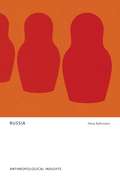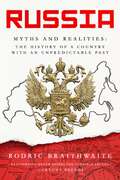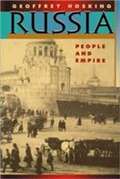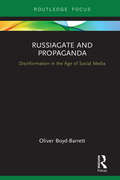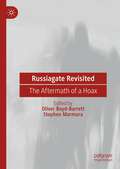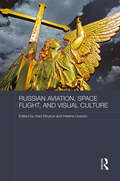- Table View
- List View
Russia's Food Revolution: The Transformation of the Food System (Routledge Contemporary Russia and Eastern Europe Series)
by Stephen K. WegrenThis book analyzes the food revolution that has occurred in Russia since the late 1980s, documenting the transformation in systems of production, supply, distribution, and consumption. It examines the dominant actors in the food system; explores how the state regulates food; considers changes in patterns of food trade interactions with other states; and discusses how all this and changing habits of consumption have impacted consumers. It contrasts the grim food situation of 1980s and 1990s with the much better food situation that prevails at present and sets the food revolution in the context of the wider consumer revolution, which has affected fashion, consumer electronics, and other sectors of the economy.
Russia's Identity in International Relations: Images, Perceptions, Misperceptions (BASEES/Routledge Series on Russian and East European Studies)
by Ray TarasBringing together leading scholars from Russia and outside experts on Russia, this book looks at the difference between the image Russia has of itself and the way it is viewed in the West. It discusses the historical, cultural and political foundations that these images are built upon, and goes on to analyse how contested these images are, and their impact on Russian identity. The book questions whether differing images explain fractiousness in Western-Russian relations in the new century, or whether distinct ‘imaginary solitudes’ offer a better platform from which to negotiate differences. Providing an innovative comparative study of contemporary images of the country and their impact, the book is a significant contribution to studies of globalisation and international relations.
Russia's Liberal Media: Handcuffed but Free (Routledge Research in Journalism)
by Vera Slavtcheva-PetkovaThis book examines the challenges and pressures liberal journalists face in Putin's Russia. It presents the findings of an in-depth qualitative study, which included ethnographic observations of editorial meetings during the conflict in Ukraine. It also provides a theoretical framework for evaluating the Russian media system and a historical overview of the development of liberal media in the country. The book focuses on some of Russia’s most influential liberal national news outlets: "the deadliest" newspaper Novaya Gazeta, "Russia’s last independent radio station" Radio Echo of Moscow (Ekho Moskvy) and US Congress-funded Radio Free Europe/Radio Liberty. The fieldwork included ethnographic observations of editorial meetings, long interviews with editors and journalists as well as documentary analysis. The monograph makes theoretical contributions to three main areas: 1. Media systems and terms of reference. 2. Journalism: cultures, role conceptions, and relationship with power, culture and society. 3. Mediatisation of conflict and nationhood.
Russia's Middle East Policy: From Lenin To Putin (Durham Modern Middle East and Islamic World Series)
by Alexey VasilievThis extraordinary book charts the development of Russia’s relations with the Middle East from the 1950s to the present. It covers both high and low points – the closeness to Nasser’s Egypt, followed by reversal; the successful invasion of Afghanistan which later turned into a disaster; the changing relationship with Israel which was at some time surprisingly close; the relationship with Syria, which continues to be of huge significance; and much more. Written by one of Russia’s leading Arabists who was himself involved in the formation and implementation of policy, the book is engagingly written, extremely insightful, telling us things which only the author is in a position to tell us, and remarkably frank, not sparing senior Soviet and Russian figures from criticism. The book includes material based on the author’s conversations with other leading participants.
Russia's People of Empire: Life Stories from Eurasia, 1500 to the Present
by Stephen M. Norris and Willard Sunderland&“A fresh and lively approach to understanding how the various Russian empires have worked.&” —Slavic Review A fundamental dimension of the Russian historical experience has been the diversity of its people and cultures, religions and languages, landscapes and economies. For six centuries this diversity was contained within the sprawling territories of the Russian Empire and the Soviet Union, and it persists today in the entwined states and societies of the former USSR. Russia&’s People of Empire explores this enduring multicultural world through life stories of 31 individuals―famous and obscure, high born and low, men and women―that illuminate the cross-cultural exchanges at work from the late 1500s to post-Soviet Russia. Working on the scale of a single life, these microhistories shed new light on the multicultural character of the Russian Empire, which both shaped individuals&’ lives and in turn was shaped by them. &“[S]tudents of Russian empire would be well served with this work, given its snapshots of diverse imperial milieus and their attendant multicultural dialogues at the personal level.&” —Slavic and East European Journal &“This compilation . . . gives readers a more in-depth, personal understanding of how the inescapable existence of diversity in Russia and the Soviet Union related to everyday life . . . Highly recommended.&” —Choice
Russia's Protectorates in Central Asia: Bukhara and Khiva, 1865-1924 (Central Asian Studies #No. 54)
by Seymour BeckerThis book examines the Russian conquest of the ancient Central Asian khanates of Bukhara and Khiva in the 1860s and 1870s, and the relationship between Russia and the territories until their extinction as political entities in 1924. It shows how Russia's approach developed from one of non-intervention, with the primary aim of preventing British expansion from India into the region, to one of increasing intervention as trade and Russian settlement grew. It goes on to discuss the role of Bukhara and Khiva in the First World War and the Russian Revolution, and how the region was fundamentally changed following the Bolshevik conquest in 1919-20.The book is a re-issue of a highly regarded classic originally published in 1968 and out of print for some years. The new version includes a new introduction, some corrections of errors, and a survey of new work undertaken since first publication.
Russia's Regional Identities: The Power of the Provinces (Routledge Contemporary Russia and Eastern Europe Series)
by Ani Kokobobo Edith W. Clowes Gisela ErbslöhContemporary Russia is often viewed as a centralised regime based in Moscow, with dependent provinces, made subservient by Putin’s policies limiting regional autonomy. This book, however, demonstrates that beyond this largely political view, by looking at Russia’s regions more in cultural and social terms, a quite different picture emerges, of a Russia rich in variety, with different regional identities, cultures, traditions and memories. The book explores how identities are formed and rethought in contemporary Russia, and outlines the nature of particular regional identities, from Siberia and the Urals to southern Russia, from the Russian heartland to the non-Russian republics.
Russia's Regional Museums: Representing and Misrepresenting Knowledge about Nature, History and Society (BASEES/Routledge Series on Russian and East European Studies)
by Sofia GavrilovaThis book presents the results of extensive research into the very interesting phenomenon of local museums—kraevedschskyi museums—in Russia’s regions. It outlines how numerous such museums are, how long they have existed, what they display, and how this has changed, or not, from Soviet times up to the present. It shows how the museums’ displays often are about nature, history, and society. It goes on to discuss how what is portrayed represents particular interpretations of knowledge— including the heroism of the Soviet past, a colonial-style view of Russia’s very many non-Russian people, and the failure to mention things which might present Russia in a critical way. The book is much more than ‘museum studies’: it sheds a great deal of light on how Russians think about themselves and about how this self-view is fostered, and it also highlights the vast regional differences which exist in Russia.
Russia's Relations with Kazakhstan: Rethinking Ex-Soviet Transitions in the Emerging World System (Routledge Advances in International Relations and Global Politics)
by Yelena Nikolayevna ZabortsevaRecent political developments in post-Soviet countries have raised novel issues regarding the stability of the post-Cold War world order. A new direction in policy has been exemplified by the recent bolstering of a number of post-Soviet political and economic institutions - such as CSTO, SCO and the Eurasian Economic Union - in which the role of Kazakhstan is considerable. In addition to its unique geopolitical location, Kazakhstan’s importance in regional integration structures and international relations more broadly is reinforced by its rich oil and uranium deposits. This book centres on an exploration of the changing relations between Russia and Kazakhstan and their impact on post-Soviet interactions with the rest of the world. The role of specific factors in the formation of the post-Soviet regional system will be explored in historical perspective. The multifaceted relations between Kazakhstan and Russia from 1991 to the contemporary period will be analysed in terms of relations in several spheres: political, military and security, Kazakhstan’s nuclear withdrawal, ethnicity and national identity, economic, foreign policies, regionalism and international trends and the impact of historic trends. An important analysis of Kazakhstan, the second largest country in the post-Soviet world, this book is of interest to researchers of International Relations, Post-Soviet Studies and Central Asia Studies.
Russia's Sakhalin Penal Colony, 1849–1917: Imperialism and Exile (Asia, Europe, and Global Connections)
by Andrew A. GentesThis book provides a comprehensive history of the genesis, existence, and demise of Imperial Russia’s largest penal colony, made famous by Chekhov in a book written following his visit there in 1890. Based on extensive original research in archival documents, published reports, and memoirs, the book is also a social history of the late imperial bureaucracy and of the subaltern society of criminals and exiles; an examination of the tsarist state’s failed efforts at reform; an exploration of Russian imperialism in East Asia and Russia’s acquisition of Sakhalin Island in the face of competition from Japan; and an anthropological and literary study of the Sakhalin landscape and its associated values and ideologies. The Sakhalin penal colony became one of the largest penal colonies in history. The book’s conclusion prompts important questions about contemporary prisons and their relationship to state and society.
Russia's Security and the War on Terror
by Mikhail TsypkinThis book discusses and provides examples of Russia‘s need to reshape its security and military policies in order to meet the global challenges of fighting terrorism and counterinsurgency. It addresses some of the problems facing Russia‘s national security and military power, including:military reformUS-Russian relationsthe political economy of Rus
Russia's Skinheads: Exploring and Rethinking Subcultural Lives (Routledge Contemporary Russia and Eastern Europe Series)
by Hilary Pilkington Al'bina Garifzianova Elena Omel'chenkoRussia’s Skinheads: Exploring and Rethinking Subcultural Lives provides a thorough examination of the phenomenon of skinheads, explaining its nature and its significance, and assessing how far Russian skinhead subculture is the ‘lumpen’ end of the extreme nationalist ideological spectrum. There are large numbers of skinheads in Russia, responsible for a significant number of xenophobic attacks, including 97 deaths in 2008 alone, making this book relevant to Russian specialists as well as to sociologists of youth subculture. It provides a practical example of how to investigate youth subculture in depth over an extended period – in this case through empirical research following a specific group over six years – and goes on to argue that Russian skinhead subculture is not a direct import from the West, and that youth cultural practices should not be reduced to expressions of consumer choice. It presents an understanding of the Russian skinhead as a product of individuals’ whole, and evolving, lives, and thereby compels sociologists to rethink how they conceive the nature of subcultures.
Russia's Sputnik Generation: Soviet Baby Boomers Talk About Their Lives
by Donald J. RaleighRussia's Sputnik Generation presents the life stories of eight 1967 graduates of School No. 42 in the Russian city of Saratov. Born in 1949/50, these four men and four women belong to the first generation conceived during the Soviet Union's return to "normality" following World War II. Well educated, articulate, and loosely networked even today, they were first-graders the year the USSR launched Sputnik, and grew up in a country that increasingly distanced itself from the excesses of Stalinism. Reaching middle age during the Gorbachev Revolution, they negotiated the transition to a Russian-style market economy and remain active, productive members of society in Russia and the diaspora. <p><p> In candid interviews with Donald J. Raleigh, these Soviet "baby boomers" talk about the historical times in which they grew up, but also about their everyday experiences--their family backgrounds; childhood pastimes; favorite books, movies, and music; and influential people in their lives. These personal testimonies shed valuable light on Soviet childhood and adolescence, on the reasons and course of perestroika, and on the wrenching transition that has taken place since the collapse of the Soviet Union in 1991.
Russia's Steppe Frontier: The Making of a Colonial Empire, 1500-1800 (Indiana-Michigan Series in Russian and East European Studies)
by Michael KhodarkovskyThis study of Russia&’s colonial expansion across the Eurasian steppe is &“a tremendously important contribution to the field of Russian history&” (Valerie Kivelson).From the decline of the Mongol Golden Horde to the end of the 18th century, the Russian government expanded its influence and power throughout its southern borderlands. The process of incorporating these lands and peoples into the Russian Empire was not only a military and political struggle but also a cultural contest between the indigenous worlds of the steppe and Russian imperial hegemony. Drawing on sources and archival materials in Russian and Turkic languages, Michael Khodarkovsky presents a complex picture of the encounter between the Russian authorities and native peoples. A major contribution to the comparative study of empires and frontiers, &“no other work treats Moscow's colonial expansion to the south and east so competently&” (Russia).
Russia's Women: Accommodation, Resistance, Transformation
by Barbara Evans Clements Barbara Alpern Engel Christine D. WorobecBy ignoring gender issues, historians have failed to understand how efforts to control women—and women's reactions to these efforts—have shaped political and social institutions and thus influenced the course of Russian and Soviet history. These original essays challenge a host of traditional assumptions by integrating women into the Russian past. Using recent advances in the study of gender, the family, class, and the status of women, the authors examine various roles of Russian women and offer a broad overview of a vibrant and growing field.
Russia, Disinformation, and the Liberal Order: RT as Populist Pariah (NIU Series in Slavic, East European, and Eurasian Studies)
by Stephen Hutchings Marie Gillespie Vera Tolz Rhys Crilley Precious Chatterje-DoodyThrough the prism of the first comprehensive account of RT, the Kremlin's primary tool of foreign propaganda, Russia, Disinformation and the Liberal Order sheds new light on the provenance and nature of disinformation's threat to democracy. Interrogating the communications strategies pursued by authoritarian states and grassroots populist movements, the book reveals the interlinked nature of today's global media-politics pathologies.Stephen Hutchings, Vera Tolz, Precious Chatterje-Doody, Rhys Crilley, and Marie Gillespie provide a systematic investigation into RT's history, institutional culture, and journalistic ethos; its activities across multiple languages and media platforms; its audience-targeting strategies and audiences' engagements with it; and its response to the war in Ukraine and associated bans on the network. The authors' analysis challenges commonplace notions of disinformation as something that Russia brings to the West, where passive publics are duped by the Kremlin's communications machine, and reveals the reciprocal processes through which Russia and disinformation infiltrate and challenge the liberal order. Russia, Disinformation and the Liberal Order provides provocative insights into the nature and extent of the challenge that Russia's propaganda operation poses to the West. The authors contend that the challenge will be met only if liberals reflect on liberalism's own internal tensions and blind spots and defend the values of open-minded impartiality.
Russia, the Caucasus, and Central Asia (Eurasia In The 21st Century Ser. #Vol. 2)
by Rajan Menon Yuri E. Fedorov Ghia Nodia East West InsituteThis comprehensive exploration of the international environment examines not only traditional political-military concerns but also economic, ethnic, and environmental issues and the role of crime, terrorism, the drug trade, and migration in the security environment of Russia and its neighbours to the south. This approach takes account of both the internal and external aspects of security problems and their interplay. The participation of international authors facilitates the consideration of each problem from all relevant points of view.
Russia-China Relations in the Post-Crisis International Order (BASEES/Routledge Series on Russian and East European Studies)
by Marcin KaczmarskiThe book explores developments in Russia-China relations in the aftermath of the global economic crisis, arguing that the crisis transformed their bilateral affairs, regional liaisons and, crucially, altered the roles both states play on the international arena. Discussing how Russo-Chinese cooperation has accelerated in energy trade, arms sales and in the Russian Far East, the focus is on how the still mutually advantageous relationship has become more asymmetric than ever, reflecting China’s meteoric rise and Russia’s decline. These dynamics are explored through three perspectives: domestic, regional and global. Domestically, the book traces the role of political coalitions and key interest groups involved in how the two states shape their reciprocal policies. Changes in the regional dimension are examined with particular reference to a new status quo emerging in Central Asia. The book concludes by explaining how the changing relationship is affecting the international order, including the balance of power vis-à-vis the United States as well as Russia and China’s changing attitudes towards global governance.
Russia-Iran Relations Since the End of the Cold War (Durham Modern Middle East and Islamic World Series)
by Eric D. MooreThis book presents a comprehensive, systematic analysis of Russia– Iran relations in the period following the collapse of the Soviet Union in 1991. It discusses the key areas – such as trade, arms sales, nuclear developments, and potential areas of friction in the Caspian Sea – where co-operation is possible; charts different phases of increasing and declining co-operation; and relates these changes to security considerations and domestic factors in both countries. Throughout, the book argues that the potential for co-operation between the two countries is much greater than people realize, and it concludes by assessing how Russia–Iran relations are likely to develop in future.
Russia: Anthropological Insights (Anthropological Insights)
by Petra RethmannThis book offers a brief introduction to the anthropological study of Russia. Moving beyond the conceptual iron curtain that has divided past study of Russia into "East" and "West," it situates Russia in a global context and provides readers with all of the necessary analytical tools for understanding the complex cultural and social configurations of the contemporary Russian Federation. Based on extensive fieldwork in Russia, it offers unique insights into a number of cultural configurations—including socialism, violence, mythology, colonialism, nationalism, gender, memory, democracy, media, and art. Through the use of interesting case studies and ethnographic "snapshots," the author has produced a lively and engaging overview of Russia’s cultural meaning and significance.
Russia: Myths and Realities
by Roderick BraithwaiteAn expert historian and former ambassador to Moscow unlocks fact from fiction to reveal what lies at the root of the Russian story.Churchill remarked that Russia is a riddle wrapped in a mystery inside an enigma. That has become an excuse for intellectual laziness. Russia is not all that different from anywhere else. But you have to disentangle the facts from the myths created both by the Russians themselves and by those who dislike them. In this dynamic new history, Rodric Braithwaite—Russia expert and former ambassador to Moscow—does exactly that, unpicking fact from fiction to discover what lies at the root of the Russian story. Russia is the largest country in the world, with the largest arsenal of nuclear weapons. Over a thousand years this multifaceted nation of shifting borders has been known as Rus, Muscovy, the Russian Empire, and the Soviet Union. Thirty years ago it was reinvented as the Russian Federation. Like the rest of us, the Russians constantly rewrite their history. They, too, omit episodes of national disgrace in favor of patriotic anecdotes, sometimes more rooted in myth than reality. Russia is not an enigma, but its past is violent, tragic, sometimes glorious, and always complicated.
Russia: People and Empire, 1552-1917
by Geoffrey HoskingThe Soviet Union crumbles and Russia rises from the rubble, once again the great nation--a perfect scenario, but for one point: Russia was never a nation. And this, says the eminent historian Geoffrey Hosking, is at the heart of the Russians' dilemma today, as they grapple with the rudiments of nationhood. His book is about the Russia that never was, a three-hundred-year history of empire building at the expense of national identity. Russia begins in the sixteenth century, with the inception of one of the most extensive and diverse empires in history. Hosking shows how this undertaking, the effort of conquering, defending, and administering such a huge mixture of territories and peoples, exhausted the productive powers of the common people and enfeebled their civic institutions. Neither church nor state was able to project an image of "Russian-ness" that could unite elites and masses in a consciousness of belonging to the same nation. Hosking depicts two Russias, that of the gentry and of the peasantry, and reveals how the gap between them, widened by the Tsarist state's repudiation of the Orthodox messianic myth, continued to grow throughout the eighteenth and nineteenth centuries. Here we see how this myth, on which the empire was originally based, returned centuries later in the form of the revolutionary movement, which eventually swept away the Tsarist Empire but replaced it with an even more universalist one. Hosking concludes his story in 1917, but shows how the conflict he describes continues to affect Russia right up to the present day.
RussiaGate and Propaganda: Disinformation in the Age of Social Media
by Oliver Boyd-BarrettThis book furthers our understanding of the practice of propaganda with a specific focus on the RussiaGate case. RussiaGate is a discourse about alleged Russian "meddling" in US elections, and this book argues that it functions as disinformation or distraction. The book provides a framework for better understanding of ongoing developments of RussiaGate, linking these to macroconsiderations that rarely enter mainstream accounts. It demonstrates the considerable weaknesses of many of the charges that have been made against Russia by US investigators, and argues that this discourse fails to take account of broader non-transparent persuasion campaigns operating in the election-information environment that are strengthened by social media manipulation. RussiaGate has obscured many of the factors that challenge the integrity of democratic process in the USA. These deserve a much higher priority than any influence that Russia may want to exert. The book concludes that RussiaGate discourse needs to be contextualized with reference to a long-established broader competition between great powers for domination of EurAsia. This pitches the US/European Union against Russia/China and perhaps, ultimately, even the USA against Europe. This book will be of much interest to students of media and communication studies, propaganda studies, US politics, Russian politics, and International Relations in general.
Russiagate Revisited: The Aftermath of a Hoax
by Oliver Boyd-Barrett Stephen MarmuraThis volume provides a comprehensive, scholarly re-examination of the events and developments collectively referred to as Russiagate. In 2016 a consensus emerged within American and British intelligence, political, and news media establishments that Russia was interfering in the United States federal election vis-à-vis an “influence campaign,” in support of the candidacy of Donald Trump. This narrative monopolized western media attention for over five years but has proven poorly founded in fact. Russiagate Revisited examines the authenticity of official Russiagate claims, the role of mainstream and alternative media as both observers of and participants in the drama, what Russiagate reveals about the state of mainstream journalism, the gambits of professional propagandists within a long-established campaign of demonization of Russia, how Russiagate narratives were perceived in Russia, and the grave implications - of both Russiagate and the decline of trust in public information - for sustainable western democracy.
Russian Aviation, Space Flight and Visual Culture (Routledge Contemporary Russia and Eastern Europe Series)
by Helena Goscilo Vlad StrukovAmong the many successes of the Soviet Union were inaugural space flight—ahead of the United States—and many other triumphs related to aviation. Aviators and cosmonauts enjoyed heroic status in the Soviet Union, and provided supports of the Soviet project with iconic figures which could be used to bolster the regime’s visions, self-confidence, and the image of itself as forward looking and futuristic. This book explores how the themes of aviation and space flight have been depicted in film, animation, art, architecture, and digital media. Incorporating many illustrations, the book covers a wide range of subjects, including the representations of heroes, the construction of myths, and the relationship between visual art forms and Soviet/Russian culture and society.
